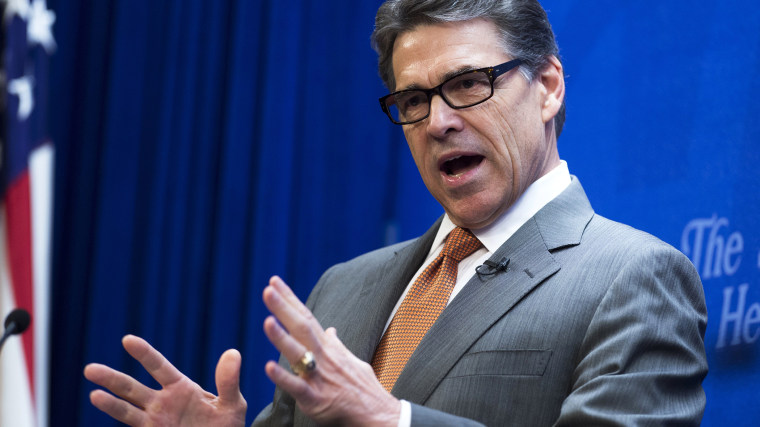Last month, Perry announced he was sending 1,000 National Guard troops to defend the border in the wake of inaction from the federal government. The move was met with skepticism, especially from border town sheriffs who wanted the resources to go towards police officers, since National Guard troops aren't allowed to arrest or detain undocumented immigrants. Others balked at the price -- it will cost an estimated $12 million a month to sustain the troops, and as of last month the state wasn't sure how it would pay that price. Now it seems that the troops arrived before the funds did. Democratic state Rep. Rene Olivera, who earlier condemned the "militarization" of the border, said "it's embarrassing that our troops have to stand in a food pantry line. This is the fault of the state."
Perry's border policy causes problems for Guard troops
Did the Texas governor deploy the National Guard to the border -- for dubious reasons -- without the proper resources?

The humanitarian crisis along the U.S./Mexico border has moved from the front page for a couple of reasons. The first, obviously, is that there have been some unrelated crises that have unfolded in recent weeks -- in Missouri, in Ukraine, in the Middle East -- that have dominated the news.
But the second is the fact that the number of unaccompanied children has dropped considerably. In his pre-Labor Day press conference, President Obama highlighted recent "progress," noting, "The number of apprehensions in August are down from July, and they're actually lower than they were August of last year. Apprehensions in July were half of what they were in June. So we're seeing a significant downward trend in terms of these unaccompanied children."
It's a complex challenge and as Josh Voorhees explained the other day, it's hard to say with confidence exactly what's caused the recent trend.
But as that discussion continues to unfold, Texas Gov. Rick Perry's (R) response to the situation is coming under new scrutiny. After he deployed National Guard troops for no particular reason, some of those troops reportedly reached out to a local food bank because the state hadn't fully planned for their deployment.
Gubernatorial hopeful Wendy Davis (D) described the lack of resources "disgraceful" and the San Antonio Express-News reported that the state senator would personally deliver food to the Guard members over the weekend.
"Whether you agree that we need the National Guard or the additional deputy sheriffs that I have previously called for to secure the border, it is shameful that our troops would be sent to keep us safe without basic supplies like food," Davis said.
As the controversy grew in Texas, it's important to note the degree to which the details began to evolve.
On Thursday, news accounts quoted a local food bank's executive director saying, "We were contacted that 50 troops that are in the Valley don't have any money for food and gas and they need our assistance." Apparently, the Guard troops were sent to the border on August 11, but weren't scheduled to be paid until September 5, and some needed local charity to bridge the gap.
But that account soon changed. The Texas National Guard soon after said only a small number of troops actually needed to rely on the food bank, and a day later, that Guard officials said the actual number was zero and the food bank was approached only as a possible, precautionary measure.
It seems some Texas officials still need to get the story straight.
Perry's "Operation Strong Safety" was a dubious policy anyway, but if the governor deployed Guard troops to the border without sufficient resources, this story may yet get worse.